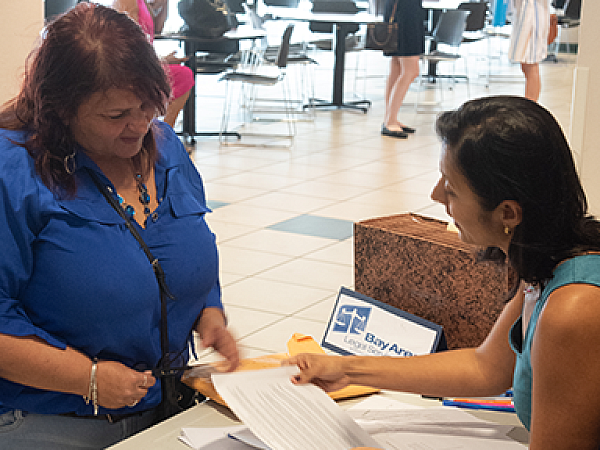Understanding SBA Assistance (VIDEO)
Hello, my name is John Lawless, staff attorney with Bay Area Legal Services’ Disaster Relief Team and the Florida Disaster Legal Aid Helpline. I’m here with my colleague Jason to discuss some simple steps anyone can take to avoid common issues while recovering from disaster.
Today, we’re here to discuss SBA disaster assistance. Many people are familiar with FEMA, but do not realize that the SBA, or Small Business Administration, also has a significant hand in providing relief to disaster survivors. Survivors often encounter the SBA as part of the FEMA application process, but it is not necessary to apply for FEMA relief in order to receive SBA assistance. When it comes to SBA disaster assistance, there are a few important initial points to remember.
- First, you do not need to be a small business in order to receive assistance from the SBA. The SBA provides low-cost loans to individuals as well as businesses that have been impacted by disasters.
- Second, referral to the SBA by FEMA is not a denial of your FEMA application. FEMA is required to defer questions to the SBA to determine if survivors might be better suited for relief through SBA.
- Third, and building on the second, denial for assistance by the SBA is not denial of FEMA assistance. Often, this just means that you will be continuing with your application for relief with FEMA. Likewise, qualifying for an SBA loan does not necessarily mean you cannot get FEMA relief either. This part can be a little more complex though, so it is often a good idea to consult with your local legal aid organization or other expert before deciding what to do.
Whether you’ve applied for relief directly with the SBA or been referred to the SBA by FEMA, there are some important differences between the two programs. To get a better idea of what they are, let’s talk to someone about SBA disaster loans.
Thanks, John. The SBA’s disaster loan program allows disaster survivors to borrow money at low rates to repair or replace their primary residence, as well as to replace personal property destroyed by a disaster.
The biggest difference for most survivors is that the program is in fact a loan, and so survivors both have to qualify for the loan based partially on credit, and will have to repay the money they borrow.
The terms of these loans change periodically, so the best way to get current information on available programs is to visit the SBA disaster assistance website.
Regardless of specific amounts, common feature of these loans is that they have low interest, deferred payment schedules, and deferred interest. That means these loans can sometimes be used to bridge gaps due to delay in insurance payments, allowing insured homeowners to begin repairs sooner, and repay the loan with insurance proceeds before interest even accrues.
SBA loans, unlike FEMA relief, can also be used to put survivors back the position they were prior to a disaster, rather than only being enough to place survivors in merely safe and sanitary conditions. This is a major reason that a survivor may choose to take out a loan rather than, or in addition to, a grant from FEMA.
Survivors may also often borrow more than their actual loss, if those additional amounts are used to make improvements to property that reduce the risk of damage in future disasters.
Several programs exist for small businesses as well, which in addition to repair and replacement can cover economic losses and improvements to property to increase disaster resilience.
Thanks.
Remember, SBA disaster loans are low-cost loans available to survivors, regardless of whether of not they own a business. Borrowers have to qualify, and the money must be repaid. It is also important for FEMA applicants to go through the SBA referral process as part of their FEMA application process. Referral to the SBA is not a denial, and application is necessary to continue with the FEMA process.
Now, if you and your family keep this information in mind, you’ll be a lot more resilient in the aftermath of disaster…
…and a lot less like Jason.
We appreciate you taking the time to listen. For more information on what to do in the wake of a disaster, please visit the following resources.
Upcoming Legal Clinics
Apply for Services
Apply by phone Monday-Friday, 9 a.m.-4:30 p.m., or apply online anytime for non-emergency legal matters. Language interpreters are available to you at no cost.
Bay Area Legal Services
If you live or have a case in Hillsborough, Pasco, Pinellas, Manatee, or Sarasota counties, we may be able to help.
Statewide Legal Helplines
If you live or have a case in Florida, we may be able to help.
